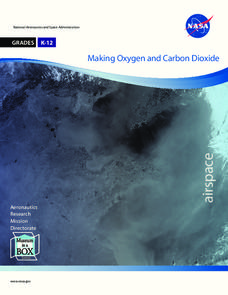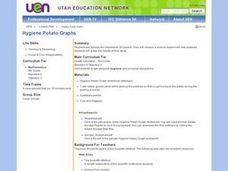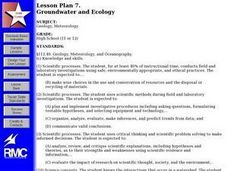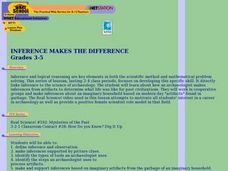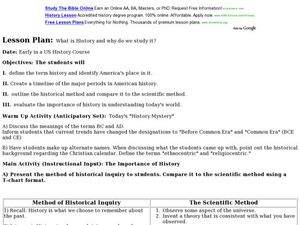Virginia Department of Education
Electricity and Magnetism
Take charge of your class and provide them with an electrical experience! Individuals investigate the basic principles of electricity and magnetism by creating a model to test electric current and the amount of electricity generated....
Virginia Department of Education
Determining Absolute Age
How can radioactive decay help date old objects? Learners explore half-life and radioactive decay by conducting an experiment using pennies to represent atoms. Young scientists graph data from the experiment to identify radioactive decay...
NASA
Making Oxygen and Carbon Dioxide
Some like it hot! Scholars observe both exothermic and endothermic reactions as part of the carbon dioxide oxygen cycle. First, scientists demonstrate (or watch) a chemical reaction to create pure oxygen using fire for confirmation....
Virginia Department of Education
Historical Models of Atoms
What does the past have to do with today? Young scientists find that answer as they learn more about past chemists and their significant contributions to the field. Pupils use the Internet to research historical figures and create a...
Scholastic
Lesson Two: The Earth, Introductory Activities
Determine what young pupils already know about earth science with a brainstorming activity. After class members work together to complete a KWL chart about the Earth, they craft an acrostic poem to demonstrate their understanding.
NOAA
A Day in the Life of an Ocean Explorer
What's life like aboard an ocean exploration vessel? Junior oceanographers examine the important role of communication in ocean research in lesson two of a five-part series from NOAA. The materials introduce the class to life on board...
Cornell University
Thin Films
Combine mathematics and science to calculate measurements of unmeasurable materials. Individuals use knowledge of density and volume to determine the thickness of the film used in production. They also apply stoichiometry to determine...
Population Connection
The Peopling of Our Planet
How many people live on the planet, anyway? The first resource in a six-part series covers the topic of the world population. Scholars work in groups to conduct research and make population posters after learning about the global...
Serendip
DNA
Get up close and personal with DNA! A two-part hands-on activity has learners extract DNA from a small organism and then their own cheek cells. Scholars then explore DNA replication using questions to guide their analyses.
Curated OER
Enlightenment Notes
In this Enlightenment study guide worksheet, students read over notes and create Cornell questions to accompany them. Students also respond to 3 short answer questions.
Curated OER
Hygiene Potato Graphs
Fifth graders discuss the importance of proper hygiene. After watching their teacher peel potatoes, they discuss why she was wearing rubber gloves. They demonstrate how to wash their hands properly and why one should never touch...
Curated OER
Recycling by Composting
Middle schoolers examine the idea of recycling by composting. Using the internet, they research the benefits of composting to the environment. In groups, they collect numbers on how much food and yard waste is produced in their...
Curated OER
Snowfall
Young scholars examine the differences between snow and rain. In this precipitation lesson, students measure one inch of rain and snow to calculate the amount of liquid water. Young scholars use a snowfall "conversion" chart to measure...
Curated OER
Pond Ecology
Fifth graders examine pond ecology, testing how temperature affects the respiration rate of fish. They collect various living things found at a pond, and identify the animal and plant life discovered. They observe a pond community in an...
Curated OER
Develop a Hypothesis
Students develop a hypothesis regarding the quality of a nearby body of water. They analyze locally collected data and compare it with data from different areas. They evaluate their original hypothesis as part of a larger unit.
Curated OER
Investigating the Probability
Students investigate probability using coins and dice. They collect data, graph, organize and interpret data. They predict, describe, compare, compute and draw conclusions based on what they observe and record.
Curated OER
Whole Lotta Shaking Going On
Students explore earthquake activity in California. They observe the historical data and create databases and graphs of the earthquakes. Students analyze the data and form a hypothesis about future earthquakes.
Curated OER
How Does the Moon Affect Tidal Range?
Eighth graders study the phases of the moon. In this tides lesson plan students use the Internet to retrieve information.
Curated OER
Groundwater and Ecology
Students are presented a problem concerning an aquifer which may be in danger from overuse by agriculture/industry. They compile data and consult online data and experts in creating a proposal to rectify the situation.
Curated OER
Inference Makes the Difference
Students explore how archaeologists make inferences from artifacts to explore what life was like in the past. In this archaeology lesson plan, students work in groups and make inferences about an imaginary household based on modern day...
Curated OER
What is History and Why Do We Study It?
Students examine why it is important to study American history. In this American history lesson, students discuss why it is necessary to study history, arrange an outline of American history events in chronological order, and write an...
Curated OER
Science: Finlay and Yellow Fever
Ninth graders research the work of Carlos J. Finlay and his contributions to science. Once they have discussed his theories about diseases, they create tables comparing diseases that use insects as carriers. The lesson also includes a...
Curated OER
Poster Assignment: Sports Chemistry
Tenth graders distinguish between chemical and physical properties and changes in matter when given specific examples. They view a video of sports activities. Students chose their favorite sport and design an experiment to improve sports...
Curated OER
Balancing Act: Olympics, Winter Sports, Ice Skating, Gravity, Physics, Science
Students, by way of the Olympic Games event of ice skating, are introduced to the concepts of gravity. They try some hands-on gravity experiments and explore the concept of gravity through art.
Other popular searches
- Scientific Method Worksheet
- Scientific Method Activities
- Scientific Method Variables
- The Scientific Method
- Scientific Method Hypothesis
- Six Step Scientific Method
- Scientific Method Lab
- Scientific Method Powerpoint
- Basic Scientific Method
- Scientific Method Botany
- Scientific Method Lab Report
- Scientific Method Vocabulary




